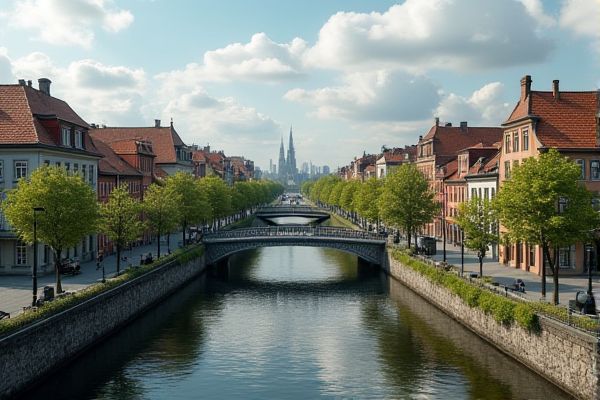
Shopping and retail options in Germany: Wide variety of supermarkets. Popular discount chains: Aldi, Lidl. Weekly farmers' markets. Shopping hours: Limited Sundays. Department stores: Karstadt, Galeria Kaufhof. Online shopping: Amazon, Zalando. Specialty stores for organic products. Cash payments preferred. Seasonal sales: Winter, Summer. Bring your own shopping bags.
Wide variety of supermarkets.
In Germany, shoppers have a wide variety of supermarkets to choose from, including major chains like Edeka, the largest with almost 6,000 stores, Rewe with over 3,000 stores, and Kaufland, known for its 600 hypermarket-style stores. Additionally, discount stores such as Aldi, Lidl, and Penny are popular shopping destinations. These supermarkets range from hypermarkets offering a broad range of goods, including non-food items, to smaller convenience stores and specialized organic markets. For more detailed information about supermarkets in Germany, you can visit the Expatica website.
Popular discount chains: Aldi, Lidl.
In Germany, Aldi and Lidl are the dominant discount retail chains. Aldi, founded by the Albrecht brothers in 1946, operates as two separate entities, Aldi Nord and Aldi Sud, with a no-frills, own-brand product approach. Lidl, part of the Schwarz Group, was established in 1973 and is known for its efficient operations, use of original delivery cartons, and a mix of branded and own-brand products, targeting a slightly more affluent demographic compared to Aldi.
Weekly farmers' markets.
Most cities and towns in Germany have weekly markets, often held one to three times a week, selling fresh produce, meats, cheeses, baked goods, and other local specialties. These markets are a true delight for both locals and visitors alike. Larger cities, such as Berlin, Munich, and Hamburg, host multiple markets, each offering a unique array of goods and a vibrant atmosphere. To explore more about these fascinating markets, you can visit the Fodor's Community where travelers and locals share their experiences and tips about enjoying the best that Germany's markets have to offer.
Shopping hours: Limited Sundays.
In Germany, shopping hours on Sundays are heavily restricted, with each state having its own regulations but generally allowing shops to open only on a limited number of Sundays per year, with specific time constraints. Most retail stores remain closed due to the federal Shop Closing Law and constitutional protections for Sunday rest.
Department stores: Karstadt, Galeria Kaufhof.
Galeria Karstadt Kaufhof, established in 2018 through the merger of Karstadt and Galeria Kaufhof, stands as the second largest department store group in Europe. This prominent retail entity, with 92 locations and 18,000 employees, has undergone significant transitions, including a rebranding to "Galeria" in 2021. Like many others, it has faced challenges such as store closures and financial aid requirements during the COVID-19 pandemic. In response, the company is now directing its efforts towards modernization and emphasizing specific product categories to set itself apart from competitors. For more detailed information about its evolution, visit Galeria Karstadt Kaufhof.
Online shopping: Amazon, Zalando.
In Germany, online shopping is dominated by platforms like Amazon.de and Zalando.de. Amazon.de is the largest marketplace in Europe, offering a wide range of products, high brand awareness, and services like Fulfilment by Amazon (FBA) and Amazon Prime. Zalando.de specializes in fashion, sports, and accessories, with over 2,000 brands, free shipping and returns, and a strong focus on the fashion niche, catering primarily to a younger audience. For more insights, you can explore the Top Marketplaces in Germany to understand their impact further.
Specialty stores for organic products.
Specialty stores for organic products in Germany are experiencing a positive recovery, driven by growing demand and collaborations between conventional retailers and organic associations. Chains like Lidl, Aldi Sud, and Tegut are expanding their organic product ranges, and regional chains such as Alnatura, Denns, and Vollcorner continue to serve a wide range of organic products. For more detailed information on this trend, visit the Bio Eco Actual website, which delves into how these partnerships and expanding product offerings are reshaping the organic market landscape.
Cash payments preferred.
Despite the rise in online purchases and digital payments, Germans still prefer cash for nearly 60% of their transactions, with cash expected to remain a significant payment method even in 2030. This phenomenon has sparked interest in examining the cultural and historical reasons behind Germany's steadfast commitment to cash. As the rest of Europe moves towards a more digital economy, Germany stands out, fostering discussions on how this cash dependency might impact the country's financial policies and global trade. For a deeper exploration into this topic, visit Foreign Policy's article that delves into Germany's enduring cash addiction and its implications for the future economy.
Seasonal sales: Winter, Summer.
In Germany, winter sales typically occur from late January to early February, while summer sales take place from late July to early August, with no legal restrictions on when these sales can be held. For more information on the timing and intricacies of these sales periods, you can visit the E-commerce Sales Dates page. Understanding these sales trends can be crucial for both retailers and shoppers looking to optimize their buying and selling strategies.
Bring your own shopping bags.
In Germany, a ban on lightweight plastic carrier bags has been implemented since January 1, 2022, prompting consumers to bring their own sturdy multi-use bags or nets when shopping, as retailers are no longer allowed to distribute these plastic bags and face fines of up to EUR100,000 for non-compliance. Many retailers had already phased out plastic bags in anticipation of the ban, encouraging the use of Reusable Bags.
